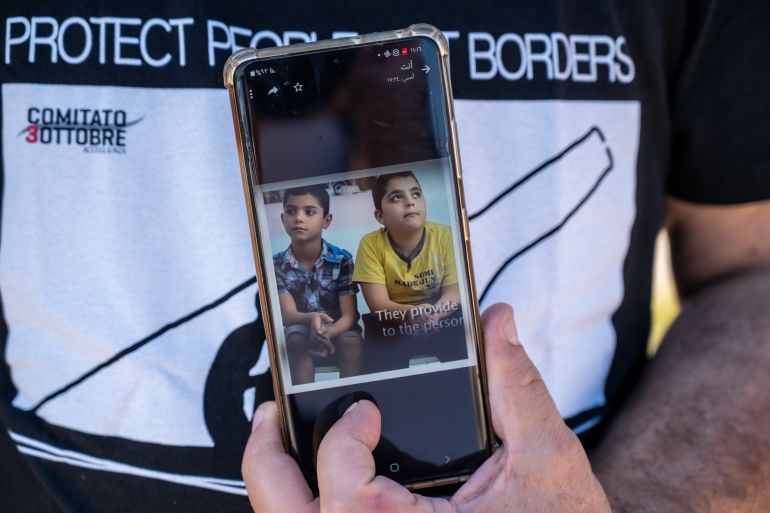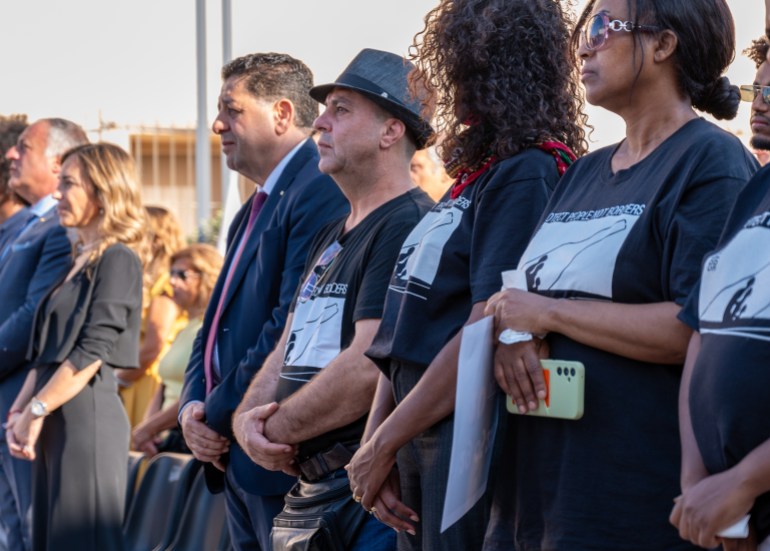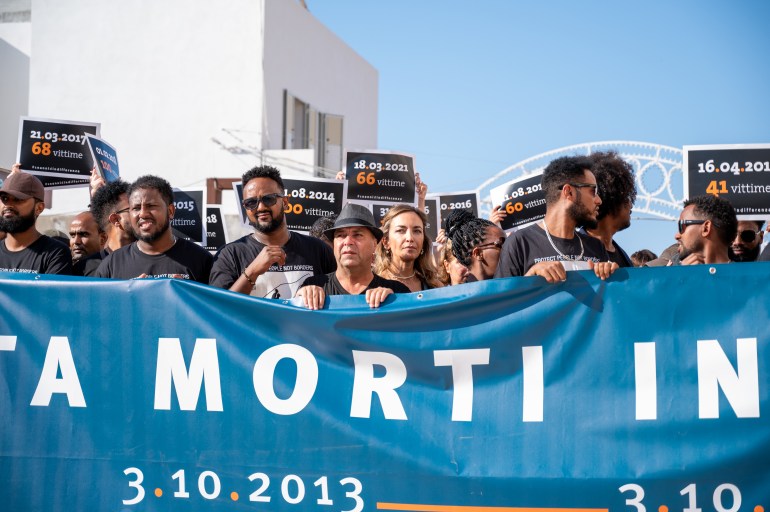Syrians long for justice 10 years after shipwreck off Italy’s Lampedusa
In 2013, the disaster, known as the ‘children’s shipwreck’, shook the world’s conscience. Those who survived still want answers.

Lampedusa, Italy – Every year, Refaat Hazima visits the tiny Italian island of Lampedusa, where tragedy struck his family 10 years ago.
On October 10, 2013, Hazima and his wife Feryal el-Saleh paid $6,000 to board a blue wooden vessel in the Libyan city of Zuwara with their three sons and more than 400 passengers, mostly fellow Syrians fleeing the war-ravaged country.
Keep reading
list of 4 itemsOn Lampedusa, the lucky few who made it across the sea live in misery
Lampedusa’s tragedies remind us we need urgent action from the EU
‘These have been 10 years of indifference, we haven’t learned anything’
The boat left under the cover of darkness at about 10pm and sailed at full speed, before coming under attack from Libyan armed men.
“They opened fire against us,” Hazima told Al Jazeera. “A bullet hit a pregnant woman and killed her.”
The vessel sailed on as water gushed into the hull through bullet holes.
As it reached international waters on the morning of October 11, a Syrian doctor, who identified himself as Mohamed Jammo, placed the first distress call to the Italian Maritime Rescue Coordination Centre (IMRCC). It was 12:39pm.
“The wooden boat is going down, please [help],” Jammo said in English, according to a transcript of the call. “We are going to die!”
For hours, Hazima clung on to his wife and children – 16-year-old Anas, 12-year-old Ahmad and nine-year-old Mohammad – searching the horizon for a rescue vessel that could bring them to safety. None arrived.
At 3:37pm, Jammo placed a sixth and final call to the IMRCC, informing Rome of the boat’s location some 32km (20 miles) off the coast of Lampedusa.
“We are falling down, now, and we have about 100 children,” he said, as the boat sank.

The vessel rocked with the waves as passengers were flung from side to side, screaming and grabbing the handrail and each other.
“My youngest son Mohammad was afraid and told me, ‘Dad, give me a kiss’, and so I did,” Hazima said. “That kiss was the last one I gave him.”
He took a deep breath as the boat rolled upside down and water came rushing in. The door to the deck slammed shut, blocking his escape route, and he pulled and pushed until it cracked open and he slid through.
Among the voices rising above the water’s surface, Hazima recognised that of his eldest son, Anas, calling for him. “I swam to him and embraced him,” he said. Yet, his wife and younger children were nowhere to be seen.
“I didn’t know what to do,” he said. “Should I leave Anas and risk him drowning to go look for the others?”
Lifeless bodies floated among survivors frantically calling for their loved ones, and he struggled to think.
Hazima eventually found his wife in a state of shock, but alive. “The only thing she would say was: ‘Where are the children?’”
At 5:54pm, an Italian military aircraft dropped rubber buoys and a raft among the survivors.
Hazima fetched one to cling on to until the Libra, an Italian military vessel, and the Maltese patrol vessel P61 reached the scene of the shipwreck shortly after 6pm.
Hazima, his wife, and their eldest son were taken to Malta alongside 52 passengers. A total of 211 survivors and 34 bodies were pulled out of the water by Italian and Maltese authorities during a rescue operation that stretched into the night.
It was one of the worst shipwrecks in the Mediterranean.
Italian authorities estimated 268 people died, including 60 children. Italian media referred to the tragedy as the “children’s shipwreck”.
Among them were Ahmad and Mohammad Hazima. Jammo, the Syrian doctor who had pleaded for rescue with Italian and Maltese authorities, also lost two children – a five-year-old and a nine-month-old.
Ten years on, no justice
On Tuesday, Hazima joined a march in Lampedusa as Italy marked a National Day of Remembrance to honour those who died in 2013, and the tens of thousands who have perished at sea since.
The anniversary is held on October 3, the day when a separate shipwreck in 2013 killed 368 asylum seekers from the Horn of Africa and shook the hearts of European leaders.
This year was especially sombre for those who had embarked on the same journey as Hazima. In December, an Italian court found the coastguard and the navy guilty of manslaughter and negligence for failing to promptly dispatch rescue assets in accordance with international law.
It concluded that Leopoldo Manna and Luca Licciardi, at the time respectively the head of the coastguard’s operation centre and the commander of the navy’s operational room, culpably and repeatedly ignored rescue requests, days after the coffins of the victims of the October 3 shipwrecks were lined up in a hangar at Lampedusa’s airport.
The defendants pleaded not guilty, claiming no Italian responsibility since the shipwreck occurred in the Maltese search and rescue area and that operations were initially coordinated by Maltese authorities. Prosecutors in Rome requested their acquittal saying the two officers had acted with “no malice”.
But call transcripts examined by the court found Manna, the head of the coastguard’s operation centre, repeatedly deflected responsibility and asked the passengers to refer to Maltese authorities.
“Call Malta directly very quickly and … they are … they are close, OK?” the officer told Jammo. “OK, please, go, go, go, OK, OK, away.”
The court found the Italian coastguard informed Malta of the distress case but failed on multiple occasions to mention that the boat was in serious trouble as the water was flowing in.
The ruling by the court of Rome confirmed an opinion issued in 2021 by the United Nations Human Rights Office, which found Italian authorities guilty of failing “to protect the right to life” of the refugees.
“It is a complex case. The accident happened in the international waters within the Maltese search and rescue zone but the location was indeed closest to Italy and to one of its naval ships,” UN Human Rights Committee member Helene Tigroudja said in a statement.
“Had the Italian authorities immediately directed [their] naval ship and coastguard boats after the distress calls, the rescue would have reached the vessel at the latest two hours before it sank.”
Although they were found guilty, Manna and Licciardi were not convicted as the trial was brought beyond the limitations period.
Arturo Salerni, a lawyer representing Hazima and other survivors, told Al Jazeera the court proceedings had been a complex and lengthy attempt at bringing two governmental bodies as civil defenders before a court of law.
The trial eventually began in July 2019 after multiple delays.
“The Public Prosecutor’s Office perpetuated the idea that there was no Italian responsibility since the shipwreck occurred in the Maltese SAR [search and rescue] area and we had to oppose several requests for dismissal,” Salerni said.
The global COVID-19 pandemic brought further delays, pushing the ruling beyond the legal timeframe. It must now be examined whether the Italian state is obliged to pay compensation to the victims in a civil law procedure.
Salerni said he felt “bitterness” at the failure to reach a criminal conviction, which would have “carried a different weight at a time when shipwrecks continue to occur at sea”.
But the 87-page sentence traced a detailed timeline of the shipwreck and established liability for the blame-shifting between Italy and Malta.
“The sentence constitutes a legal precedent and a reminder of the obligation to unconditionally rescue lives at sea,” Salerni added.
For Hazima, the prospect of a civil lawsuit feels like a punch in the face.
“If someone kills a person, especially a child, they will be sent to jail,” he said. “Why wasn’t it so in this case?”
Delayed rescue as a political tactic
The political climate in Italy has shifted since the double tragedy in 2013 prompted the left-wing government of then Prime Minister Enrico Letta to launch Mare Nostrum, a state-led operation that saved more than 150,000 lives in the Mediterranean Sea.
The life-saving naval mission was suspended in 2014 after repeated refusals by the European Union to contribute to its operational costs of about 9 million euros ($9.5m at the current exchange rate) per month and was replaced by Frontex, the EU’s border security agency, which runs the bloc’s Joint Operation Triton on a budget of 2.9 million euros ($3.05m) per month with no search and rescue mandate.
Over the course of the past decade, the responsibility for saving lives has fallen on nongovernmental organisations as the bloc’s anti-migration policies broadened and hardened.

Italian Prime Minister Giorgia Meloni rose to power last year on a promise to curb irregular migration, forming the nation’s most right-wing government since 1945.
Since coming to power, Meloni has banned NGO vessels from performing more than one rescue on a given trip, requiring them to disembark immediately – often at far-flung ports that require additional days of navigation – and impounding ships that defy the rules.
The leader of Fratelli d’Italia (FdI), a national conservative party with roots in the neo-fascist Movimento Sociale Italiano (Italian Social Movement), told a meeting of southern EU states in Malta on Friday that the bloc needed a “concrete, structured and definitive way forward” to respond to migration or “everyone will be overwhelmed”.
Meanwhile, Foreign Minister Antonio Tajani defended the government’s actions during a visit to Berlin.
“Nobody is waging a war against NGOs, we only say that they cannot … act as a sort of magnet to attract irregular migrants,” he said.
NGOs operating at sea reject the accusation.
According to Italy’s Ministry of the Interior, vessels operated by NGOs brought to shore 5,700 asylum seekers this year, about 4 percent of the total number of arrivals at sea (133,000).
Monica Minardi, head of Doctors Without Borders (also known by its French initials MSF) in Italy, is concerned by Rome’s ongoing stigmatisation of NGOs as “sea taxies” and punitive decrees that limit their ability to operate life-saving missions.
“The number of people rescued by NGOs is a minority compared to those who are saved by the coastguard,” Minardi said during a roundtable in Lampedusa on October 1. “But there is fear – a fear of the narration around migration that we are presenting.”
The European Council on Refugees and Exiles (ECRE), a European network of 105 NGOs, in May, blamed Malta and Italy for their nonresponse tactics to distress alerts in their search-and-rescue zones.
According to the Asylum Information Database (AIDA), which is managed by ECRE, Malta’s alleged lack of action resulted in the failure to rescue 7,459 people in distress in 2022.
Anger has flared among some Italians over the failure to prevent shipwrecks a short distance from shore.
In February, a vessel capsized about 74km (46 miles) off the coast of Cutro in the southern Calabria region, after being spotted by a plane operated by Frontex.
Italian authorities said the patrol boats sent to intercept it returned to port due to bad weather, resulting in delayed rescue operations.
At least 94 victims, including 35 children, died in the shipwreck, the first tragedy so close to the shore in Italy since the October 3 disaster off Lampedusa.
The shipwreck, which occurred as MSF’s Geo Barents became the first NGO vessel to be handed a fine and a 20-day halt under Meloni’s decrees, reignited the debate on immigration in Europe and Italy.
For Minardi, migration management policies can be discussed at length, but saving lives is non-negotiable.
“There is an obligation to save lives,” Minardi said. “We must remember that no life is worth more than another.”